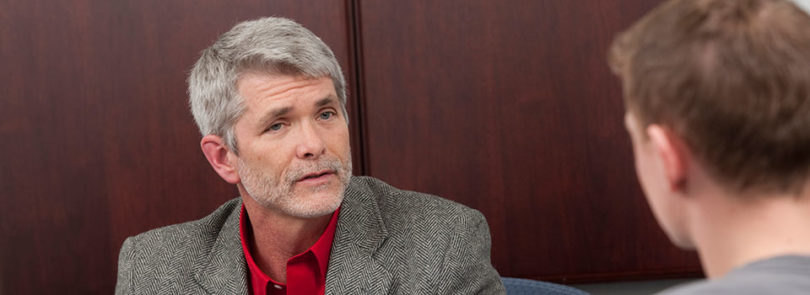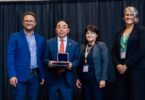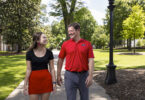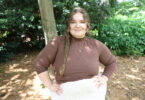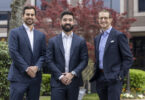David Gattie, associate professor in the College of Engineering, wants students to realize that they’re capable of accomplishing far more than they might imagine.
Where did you earn degrees and what are your current responsibilities at UGA?
I graduated from the University of Georgia in 1983 with a B.S. in agricultural engineering. In 1993, while working in the private sector, I earned my Ph.D. in ecology. Currently, I’m an associate professor in the College of Engineering, and my primary responsibilities are in the environmental engineering program, in which I serve as coordinator for instruction. My current teaching and research interests are energy systems and natural resources.
When did you come to UGA and what brought you here?
Following graduation in 1983, I worked in the private sector until 1998. However, in 1996 I ran into Ron McClendon, another professor in UGA’s engineering program, in the parking lot of a local convenience store. As we updated each other on our lives and careers, Ron asked if I had any interest in teaching. At the time, I was still working full time for a private company but was teaching math courses in the evening for a small college. There happened to be some teaching needs in the biological and agricultural engineering department, and Ron arranged an interview for me. Dale Threadgill (founding interim dean of the College of Engineering) hired me as a temporary, part-time instructor beginning fall 1996. I continued teaching part time until fall 1999, when I became an assistant professor. I was promoted to associate professor with tenure in 2006.
What are your favorite courses and why?
In general, I really enjoy teaching freshman and sophomore courses because I have the opportunity to help younger students realize that they’re capable of doing far more than they might imagine. Freshmen are oftentimes quite intimidated by their first year of college, and I take seriously my responsibility for building confidence in these students at this point in their lives. In particular, my favorite courses are “Introduction to Environmental Engineering and Sustainability” and “Energy Systems and the Environment.” These courses delve into significant aspects of the interrelationship between energy and environmental resources and how dependent we, as a society, are on maintaining that relationship without crippling our economy. To me, economic growth and development are critical to engineering decision-making. It’s quite easy to include current issues in these classes, and students generally like to see how their college courses relate to the realities of today.
What interests you about your field?
One of the things we try to impress on our environmental engineering students is how dynamic the field is and how often the landscape changes. While the technical engineering aspects are based on consistent foundational principles of science and engineering, the practice of environmental engineering is uniquely constrained by economics, politics and environmental policy—all of which change with election cycles and economic upturns and downturns. While these constraints can be daunting, I love the economics and politics of it. I also love teaching our students how the currents and dynamics of economics, politics and policy will be some of the most challenging constraints they face in engineering problem solving.
What are some highlights of your career at UGA?
The most life-changing experiences I’ve had at UGA were my service-learning projects in Costa Rica, where I met and worked with a man named Eladio Chinchilla who, one year, took my engineering students and me on a full-day hike to see the water source and delivery system for his small community. While the natural beauty of the forest spoke for itself, Señor Chinchilla’s personal account of how this community poured its heart, soul and physical strength into manually constructing a water system along unimaginably difficult terrain reached into my soul and touched a place that I didn’t know existed until that day. We saw engineering in its purest and best form, in which a social need was met through ingenuity, a collective community effort and an unwavering blue-collar work ethic. I’ve never been the same since and I will never forget Señor Chinchilla and the life I saw in this man.
How does your research or scholarship inspire your teaching, and vice versa?
My current research involves energy systems and the environment, so it’s a natural and quite easy translation of these topics into the classroom. However, my teaching probably provides me with more inspiration for research than does my research for teaching. The reason being is that students can ask some really tough and necessary questions that are beyond the boundaries of my own research. I hate not being able to respond or answer questions, so I’ll end up digging as much as I can to get answers. This usually ends up benefitting me more than it does the students.
What do you hope students gain from their classroom experience with you?
The understanding that the issues facing today’s generation and the issues facing tomorrow’s generation are legacy issues from my generation, and the approaches, methods and overall thinking that worked for the problems and issues of my time will not necessarily work in today’s world or in the days ahead. And I hope they gain the confidence to engage these issues head-on, because I’m confident that they’ll be prepared to do just that.
Describe your ideal student.
They are a self-learner with a blue-collar work ethic. By that, I mean students who don’t simply believe everything they hear; they bring their own experiences and beliefs into the classroom; they never give up on themselves; and they politely, respectfully, yet confidently, “push back” whenever they don’t agree with something that’s being discussed. These students who think for themselves and prove things for themselves have all the confidence in the world to tackle our toughest challenges.
Favorite place to be/thing to do on campus is.
My favorite place to be is in the classroom or in my office with students discussing, arguing and talking about issues and problems. I really love to hear them talking things out.
Beyond the UGA campus, I like to.
In general, I love doing anything with my wife and children. Other than that, I really like keeping up with what’s going on in the world, reading and keeping the woods cleared around our house.
Community/civic involvement includes
Since our children are, for the most part, grown now, I’m not as involved in PTO, Little League and high school baseball as I once was. So now, I really like being involved with economic development activities. In particular, I enjoy working with the Oconee Chamber of Commerce.
What is favorite book and movie, and why?
My favorite book is “The Quest,” by Daniel Yergin. It’s the single best account I’ve ever read about the technical, political, economic, environmental and historical facets of energy and our dependence on it. I’ve never marked up a book as much as I did this one.
My favorite movie—that’s a tough one. Movies are pretty special in our family, and I have favorites that remind me of each of them. But, I’ll have to go with “It’s a Wonderful Life”—it sums up a lot about life for me, personally. That is, no matter how bad things may seem to be, when I think about my wife, children, friends and the students I have the opportunity to teach, I realize life is really good.
Proudest moment at UGA?
In 2012, when our undergraduate environmental engineering undergraduate program received full ABET accreditation. I’ve been involved with the program from its beginning and this was the culmination of a five-year effort during which our environmental engineering faculty conceptualized the program of study, developed and implemented the courses, and eventually worked through the accreditation process. It was the first new engineering program to be accredited in UGA’s College of Engineering, and we (John Schramski, Jenna Jambeck, Hillary Tanner, Ke Li, Jason Christian, Nadia Kellam, Jo Walther, Nicki Sochacka and I) found ourselves having accomplished something quite significant—something that our students deserved and for which they could be proud.
Is there anything else you’d like to add?
When I look at students in my classroom, I see the faces of my wife and children, which is an ever-present reminder of the responsibility I have for someone else’s children. Whatever good things I’ve done or accomplished, it’s because my wife, Zoe, and our children, Jeremy, Annah Kaye and Buck, are at the very foundation and core of my life. Especially Zoe—I fell in love with her over 37 years ago, I’ve been dating her since I was 15 years old, and every day of my life she’s why my heart beats…I love that girl.


